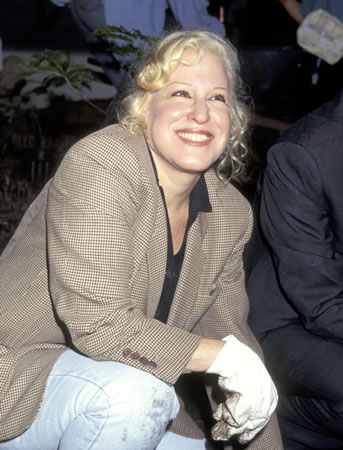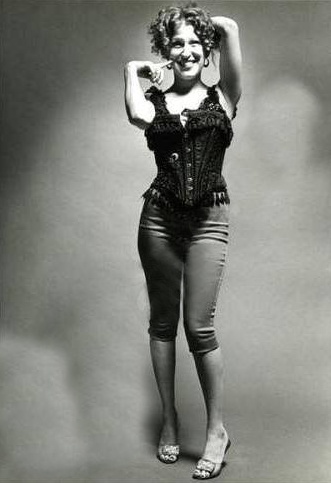Mister D: Why isn’t Bette on the cover of this magazine? I like Julia Roberts, but, who knew she was concerned enough to be on the cover…??? Well, we kind of know…But how Divine it would be to see Bette on that cover. Any artists or photoshop people want to have some fun???

Photograph by Annie Leibovitz
GEORGE AND JULIA GO GREEN FOR VANITY FAIR
2006-04-03 23:57:21 – PR Inside
Hollywood pals GEORGE CLOONEY and JULIA ROBERTS have gone green for the cover of style magazine Vanity Fair’s upcoming environmental issue.
The couple, who played man and wife in OCEAN’S ELEVEN, appear alongside environmentalists AL GORE and ROBERT F KENNEDY in the new photoshoot, in which everyone wears green.
Roberts appears like a wood nymph in the garden-themed shot, complete with a leafy crown on her head, while Clooney wears a smart dark green suit. The first Green Issue of Vanity Fair will hit newsstands on 11 April (06).
Clooney’s efforts to raise environmental awareness and inspire activism are profiled, along with the work of other stars like ARNOLD SCHWARZENEGGER, BETTE MIDLER and EDWARD NORTON.
In the accompanying feature, SYRIANA star Clooney announces his plans to create Oil Change, a campaign to educate audiences and reduce dependence on oil.
Meanwhile, Clooney has traded in his BMW for an eco-friendly Tango, which features in the photo spread inside the new Vanity Fair. (KL/WNVET/JB)
VANITY FAIR’S FIRST-EVER “GREEN ISSUE”

Vanity Fair presents its first “Green Issue,” beginning an “increased commitment to reporting on the threat to our precious environment,” says editor Graydon Carter. The May cover features a quartet of eco”“power players, capturing Hollywood glamour and activist passion: Robert F. Kennedy Jr., Al Gore, Julia Roberts, and George Clooney, photographed by Annie Leibovitz. Articles inside address the pressing environmental issues of the day: Mark Hertsgaard reports on the reality of global warming; Michael Shnayerson writes on the Appalachian mountaintop-mining crisis; and a Green Guide offers up 50 simple things you can do in your daily life to help save the planet.
The May Green Issue of Vanity Fair hits newsstands in New York and Los Angeles on April 5 and nationally April 11.
Al Gore became the unlikely “It boy” of this year’s Sundance Film Festival, thanks to Davis Guggenheim’s documentary An Inconvenient Truth, which follows the former vice president on his relentless worldwide quest to expose the grave truth about climate change. But the fight against global warming is nothing new for Gore, who has made the environment a key part of his life for more than 25 years. Gore faced ridicule in the 2000 presidential campaign for pushing the idea of hybrid cars, and forged ahead with the Kyoto Protocol talks even after aides warned it was an unpopular move. Now, the Bush administration’s negligence toward our planet is facing one consequence it didn’t foresee: the unleashing of Gore’s anger, passion, wisdom, and intellect, untethered by advisers. Inside the issue, Gore’s essay, “The Moment of Truth,” explores the danger of the climate crisis, as well as the unprecedented opportunities it presents. Gore asks, “So why is it that our leaders seem not to hear such clarion warnings? Are they resisting the truth because they know that the moment they acknowledge it they will face a moral imperative to act? Is it simply more convenient to ignore the warnings?” Furthermore, he writes, “Where there is a blinding lack of situational awareness, the people perish.”
One of the most respected environmental advocates in the country, Robert F. Kennedy Jr. works as a lawyer for Riverkeeper, a watchdog organization that monitors and protects the Hudson River ecosystem and New York City’s water supply. He is a professor at the Pace University School of Law, works as a senior attorney for the Natural Resources Defense Council, and somehow finds the time to broadcast his pro-environmental message via his weekly radio show on Air America. In Kennedy, the family that was in the thick of 20th-century events has a formidable representative in what may be the most pressing issue of the 21st.
Roberts, an admitted latecomer to environmental concerns, is proof that it is never too late to start caring about the earth. Why the late transformation into environmentalist? A couple of 18-month-olds could do it to a person. “People think, Well, I won’t be here when the planet implodes,” she says. “But maybe your grandchildren will, or your great-grandchildren, or your great-great-grandchildren. And if you could give them one more day on earth, wouldn’t you do that for them?” Currently building a solar-powered home in California, Roberts believes that the little things make a difference, from the metal cup she uses when she goes out for coffee, to the grocery bags she returns to the store for a nickel, to her twins’ environmentally friendly Seventh Generation diapers. “At a time like the one we’re in right now, where you feel like government and big business are kind of the same thing, people feel like the die is cast,” she says. “So much has already been destroyed and done and you can’t go back. Well, we can go forward, in a different way.”
Two thousand five was the year of George Clooney–and not only because he starred in two of the most important movies of the year. With Syriana, about the corruption arising from the United States’ dependence on oil, Participant Productions, one of the movie’s producers, worked with the Sierra Club and the Natural Resources Defense Council to create a campaign called Oil Change, which offers audiences ways to cut their dependence on oil. “If you’re doing a movie about oil consumption and corruption, you can’t just talk the talk,” Clooney–who drove his fully-electric, zero-emission, two-seater Tango to the cover shoot–told Leibovitz and her crew. “You gotta walk the walk.”
Vanity Fair takes an in-depth look at the challenge ahead with a 30-page portfolio of a passionately pro-environment new generation. The portfolio includes:
Arnold Schwarzenegger and George Pataki, the governors who have often found themselves at odds with their fellow Republicans in making the environment a priority.
Yvon Chouinard, founder and owner of Patagonia, who donates 30 percent of his annual salary to activist environmental groups and promises to post bail for employees arrested for nonviolent civil disobedience (after receiving protest training) in support of environmental causes.
Lord John Browne, C.E.O. of British Petroleum, for filling the best chair in the boardroom of the world’s second-largest oil company with an environmentalist.
Zac Goldsmith, environmental attaché to David Cameron (the new leader of the U.K. Conservative Party), is best known as a tireless environmentalist whose substantial inherited wealth (he’s the son of the late British financier Jimmy Goldsmith and the brother of Jemima) lends him a certain freedom and panache that old-school, Earth First! environmentalists–with their drab fashion sense and lentil-heavy diet–clearly lack. Goldsmith lives on an organic farm in Devon with his wife, a former model, and their three children; they are easily the eco-movement’s most glamorous family.
The Natural Resources Defense Council, who, with the backing of its 1.2 million members and online activists, its $60 million annual budget, and its team of top-notch scientists, lawyers, and economists, goes up against those in power who would foul the air, land, and water.
Ali Hewson, the driving force behind Edun Apparel (which she started last year with her husband, Bono, and New York designer Rogan Gregory), for bridging the worlds of fashion, environmentalism, and human rights by using organic products, paying workers a fair wage, and making sure workers are treated humanely.
Edward Norton, actor and solar enthusiast, for hooking up oil-giant B.P. with Enterprise Community Partners, an affordable-housing nonprofit founded by his grandfather, to act on his idea that for every celebrity who installed a B.P. solar system in his or her home, B.P. would donate another such system to a poor L.A. family. To date, the B.P. Solar Neighbors Program has equipped 27 lower-income families with panels, and 50 more free systems are on the way.
Li Moxuan, climate researcher and campaigner for Greenpeace China, for her work in drawing attention to the plight of the Yellow River, which she says is in danger of running dry.
Hank Paulson, chairman and C.E.O. of the Goldman Sachs Group, for exploiting the resources of his office in the service of capitalism and environmentalism. After defaulted loans left Goldman in possession of 680,000 acres of old-growth forest and peat bog in Tierra del Fuego, the bank chose not to sell the land and recoup its investment but to donate it to the Wildlife Conservation Society on behalf of the people of Chile in September 2004.
Graham Hill, treehugger.com; Jennifer Boulden and Heather Stephenson, idealbite.com; Laurie David, stopglobalwarming.org; and Chip Giller, grist.org, for proving that while sitting at a computer may never be the most decisive, muscular way of saving anything, the electronic dissemination of information and sense of purpose shared online are key to the call-up and formation of battle stratagems for the massing armies of eco-warriors.
Go Zero: Ed Begley Jr., actor; Lauren Shuler Donner, producer; Aisha Tyler, actress; Josh Bernstein, environmentalist-adventurer; Sylvia Earle, explorer; Nia Vardalos, actress; Daryl Hannah, actress; Martin Short, actor; Dan Lukin, environmental advocate; Minnie Driver, actress; and Steve Rendle, president of North Face, who have all “gone zero.” Go Zero, a program run by the Conservation Fund, is dedicated to helping individuals and businesses measure how much they contribute to greenhouse gases and provides them with an easy way to do something about it. After you tally up how much you pollute online at gocarbonzero.org, Go Zero will plant the number of trees necessary to absorb your emissions.
Bette Midler, singer, actress, and founder of the New York Restoration Project, whose goal is to restore thousands of acres of neglected city parkland, especially in poor neighborhoods. Since she started the organization in 1995, it has hauled out roughly 80,000 tons of trash, kept more than 400 acres of riverfront land and 50 city-owned lots from the clutches of developers, and tilled the soil of many community gardens gone to seed.
Wangari Muta Maathai, 2004 Nobel Peace Prize winner, government minister, biology professor, and famed Kenyan tree-planting activist, for enabling the Nobel committee to recognize the connection between peace and environmentalism.






